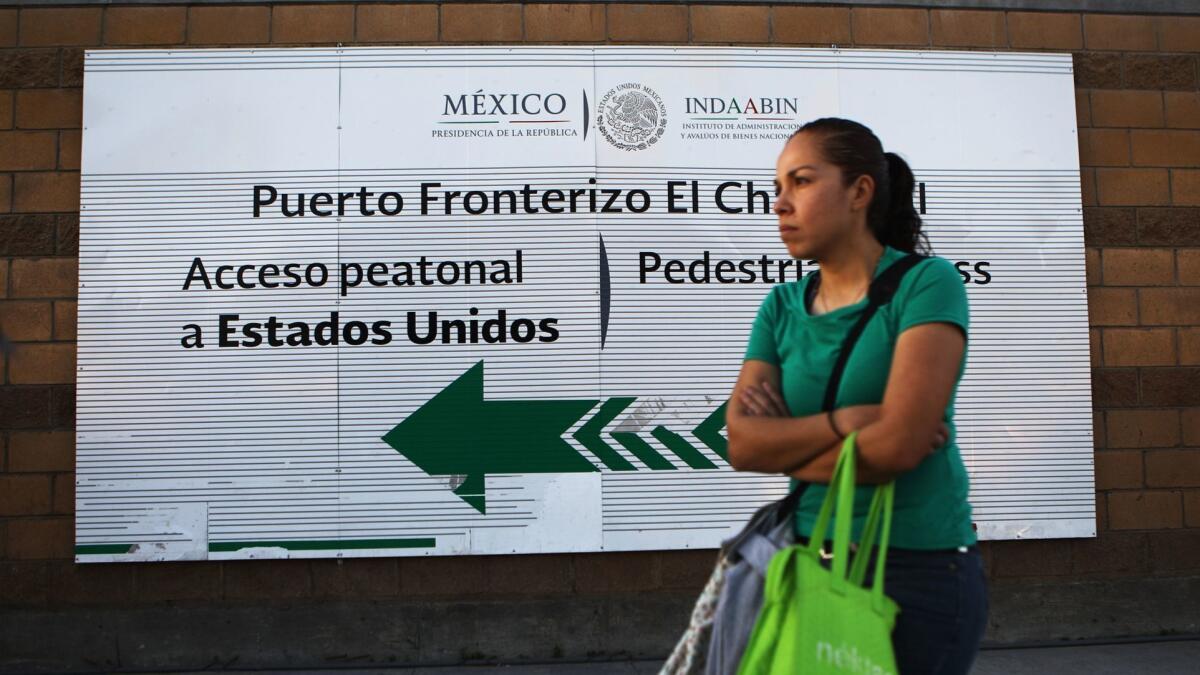Immigrants rejected for asylum may appeal removal orders, 9th Circuit rules

- Share via
Reporting from San Francisco — A federal appeals court decided Thursday that immigrants who cross the border without authorization may go to court to appeal a decision by U.S. immigration authorities to deny them asylum.
The decision, by a three-judge panel of the U.S. 9th Circuit Court of Appeals, could keep immigrants in the country for years while they challenge the government’s denial of asylum.
The appeals court reached the decision after concluding that a 1996 federal law restricting appeals violated the Constitution.
The case is likely to go to the U.S. Supreme Court.
The 9th Circuit noted that the high court has yet to consider the question of whether asylum seekers arrested shortly after crossing the border have a constitutional right to challenge the government’s denial.
The only other federal appeals court to rule on the question, the Philadelphia-based 3rd Circuit, reached a different conclusion.
The 3rd Circuit decided in 2016 that immigrants arrested after just crossing the border were not entitled to challenge their removal through habeas corpus.
Thursday’s ruling stemmed from a case brought by Vijayakumar Thuraissigiam, a native of Sri Lanka and a Tamil, an ethnic minority there.
The ACLU, which represented him, said the decision had sweeping implications.
“It will mean that thousands of current and future noncitizens will not be sent back to potential death without a federal court looking at their case,” said Lee Gelernt, deputy director of the ACLU’s Immigrants’ Rights Project.
He said the decision “reaffirms the right to habeas corpus applies to citizens and noncitizens, regardless of how long they have been in the U.S.”
Thuraissigiam fled Sri Lanka in June 2016 and went to Mexico. On Feb. 17, 2017, Thuraissigiam crossed into the U.S. and was arrested by a border patrol officer 25 yards north of the border.
An officer who interviewed Thuraissigiam found he lacked a credible fear of persecution, a supervisor approved the asylum denial and an immigration judge upheld the decision. The 9th Circuit called the process “a cursory review.”
A district court dismissed Thuraissigiam’s case and he appealed to the 9th Circuit.
In challenging his asylum denial, Thuraissigiam said his interview with an immigration officer was marred by language difficulties.
He also said that Sri Lanka officers detained and beat him for supporting a Tamil political candidate, and the country’s intelligence officers later kidnapped and tortured him.
In ruling for Thuraissigiam, the 9th Circuit said the federal law restricting court review of asylum denials violated the Suspension Clause, which says the writ of habeas corpus may not be suspended unless required by rebellion or public safety.
“There is no question that Thuraissigiam was apprehended and detained within the sovereign territory of the United States,” the 9th Circuit said. “This factor weighs strongly in favor of finding Thuraissigiam has rights under the Suspension Clause.”
Review by the federal courts “provides important oversight” of whether the Department of Homeland Security complied with procedures, the court said.
“We think it obvious that the constitutional minimum — whether Thuraissigiam was detained pursuant to the `erroneous interpretation or application of relevant law’ — is not satisfied,” wrote Judge A. Wallace Tashima, joined by Judges M. Margaret McKeown, and Richard A. Paez. All three judges were appointed by President Clinton.
Thuraissigiam has been detained in an immigration facility for two years.
Thursday’s ruling allows asylum seekers to remain in the country not just for a district court hearing but for appeals. Gelernt, though, said he believed the legal process could be handled efficiently.
“We don’t think it needs to bog down the system,” he said.
A spokesperson for the U.S. Dept. of Justice declined comment.
Twitter: @mauradolan
More to Read
Sign up for Essential California
The most important California stories and recommendations in your inbox every morning.
You may occasionally receive promotional content from the Los Angeles Times.














